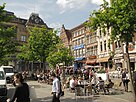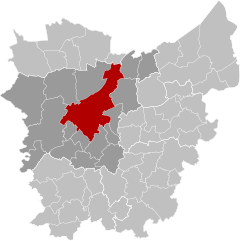Ghent
Gent (Dutch) Gand (French) | |
|---|---|
City and municipality | |
Clockwise from top: the Graslei, the Gravensteen, Ghent Tower Row (St. Nicholas' Church, Belfry, St. Bavo's Cathedral), and the Vrijdagmarkt | |
| Coordinates: 51°03′13″N 03°43′31″E / 51.05361°N 3.72528°E | |
| Country | |
| Community | Flemish Community |
| Region | Flemish Region |
| Province | East Flanders |
| Arrondissement | Ghent |
| Government | |
| • Mayor (list) | Mathias De Clercq (Open VLD) |
| • Governing party/ies | Vooruit-Groen, Open VLD, CD&V |
| Area | |
| • Total | 157.77 km2 (60.92 sq mi) |
| Population (2022-01-01)[1] | |
| • Total | 265,086 |
| • Density | 1,700/km2 (4,400/sq mi) |
| Postal codes | 9000–9052 |
| NIS code | 44021 |
| Area codes | 09 |
| Website | www.gent.be |
 Logo of Ghent | |
Ghent (Dutch: Gent [ɣɛnt] ; French: Gand [ɡɑ̃] ; historically known as Gaunt in English) is a city and a municipality in the Flemish Region of Belgium. It is the capital and largest city of the province of East Flanders, and the third largest in the country, after Brussels and Antwerp.[2] It is a port and university city.
The city originally started as a settlement at the confluence of the Rivers Scheldt and Leie and in the Late Middle Ages became one of the largest and richest cities of northern Europe, with some 50,000 people in 1300. After the late 16th century Ghent became a less important city, resulting in an extremely well-preserved historic centre, that now makes Ghent an important destination of tourism.
The municipality comprises the city of Ghent proper and the surrounding suburbs of Afsnee, Desteldonk, Drongen, Gentbrugge, Ledeberg, Mariakerke, Mendonk, Oostakker, Sint-Amandsberg, Sint-Denijs-Westrem, Sint-Kruis-Winkel, Wondelgem and Zwijnaarde. With 262,219 inhabitants at the beginning of 2019, Ghent is Belgium's second largest municipality by number of inhabitants. The metropolitan area, including the outer commuter zone, covers an area of 1,205 km2 (465 sq mi) and had a total population of 560,522 as of 1 January 2018, which ranks it as the fourth most populous in Belgium.[3][4] The current mayor of Ghent is Mathias De Clercq (Open Vld).
The ten-day-long Ghent Festival (Gentse Feesten) is held every year and attended by about 1–1.5 million visitors.
- ^ "Bevolking per gemeente op 1 januari 2022". Statbel.
- ^ "Medieval and magical, vibrant and edgy – the Belgian city is a sensory overload". The Guardian. 23 February 2020. Retrieved 14 March 2020.
- ^ Statistics Belgium; Werkelijke bevolking per gemeente op 1 januari 2008 (excel-file) Archived 26 January 2009 at the Wayback Machine Population of all municipalities in Belgium, as of 1 January 2008. Retrieved on 19 October 2008.
- ^ Statistics Belgium; De Belgische Stadsgewesten 2001 (pdf-file) Archived 29 October 2008 at the Wayback Machine Definitions of metropolitan areas in Belgium. The metropolitan area of Ghent is divided into three levels. First, the central agglomeration (agglomeratie) with 278,457 inhabitants (1 January 2008). Adding the closest surroundings (banlieue) gives a total of 455,302. And, including the outer commuter zone (forensenwoonzone) the population is 594,582. Retrieved on 19 October 2008.







